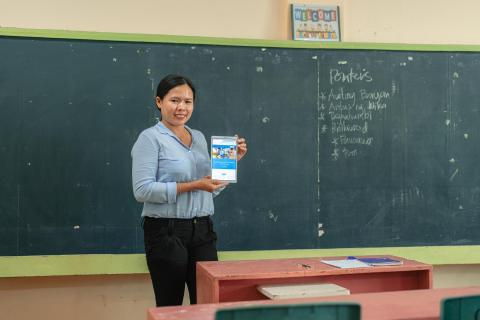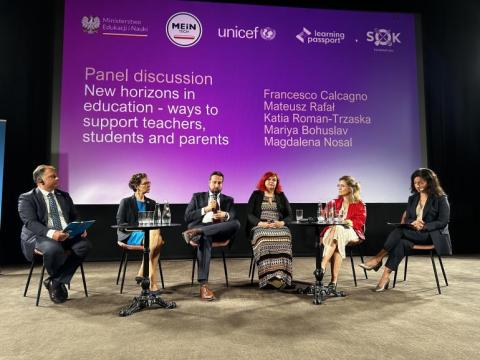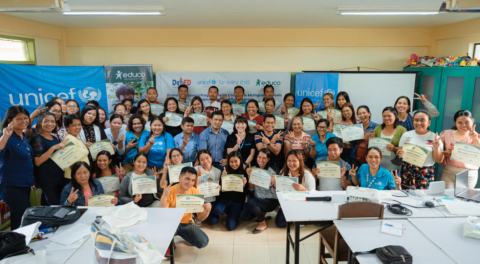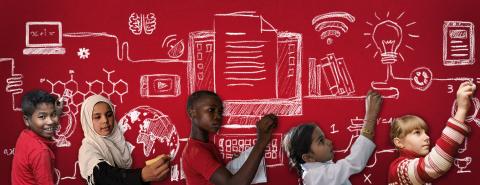A passport to educational opportunity for girls in Jordan
The Learning Passport

11th October 2021 – “I have always loved education” says Amani, 19-years-old, as she clutches on to a smartphone, scrolling casually through the Learning Passport mobile application.
For almost a decade, the road to a successful education has not been easy for Amani. From fleeing violent conflict to arrive in Azraq Refugee Camp at the age of 10 to live in a cramped tent with her nine family members, to having friends and family members encouraging her to drop out of school to marry at a young age – Amani has always been steadfast in her desire to be educated.
“When someone asks me why I didn’t get married as young as my sisters, my answer is always the same: I have too much to achieve in my life before that!” exclaims Amani. “My sister has five children, and she is only 18 years old; it is a lot of responsibility for a young girl.”
Education remains a strong protective factor against child marriage, particularly for girls. Girls who marry before the age of 18 are more likely to experience domestic violence and less likely to remain in school. They face worse economic and health outcomes than their unmarried peers, which impacts the outcomes of their own children, further straining a country’s capacity to provide quality health and education services.
Before the COVID-19 pandemic, 100 million girls were expected to marry before their eighteenth birthday in the next decade. Now, up to 10 million more girls will be at risk of becoming child brides due to the pandemic.
The COVID-19 Pandemic
When the COVID-19 pandemic hit Jordan, schools and other educational centres were closed to protect the population. Learning switched from being in the classroom to online. For some students, such as Amani, the change wasn’t something that was easy to get used to straight away.
“It wasn’t easy, as teachers were not there in person to help me catch up”, explains Amani. “They’d record videos of themselves explaining the lessons to send to us, but it would take almost a day to download the videos, as the phone I was using was old and the internet connection was poor.”
Through hard work and determination, Amani graduated from high school with high marks. Still, she was already looking for ways to help her younger siblings so they would not experience the same challenges with digital learning she faced.
Thankfully, extra help was on hand.
Through an initiative aimed at encouraging high school graduates to continue their education, UNICEF provided Amani with a new smartphone that had a higher capacity to download videos while also boasting a strong 4G internet connection.
The phone gave her access to UNICEF’s Learning Passport, a platform designed through a partnership between UNICEF and Microsoft to provide education for displaced and refugee children through digital remote learning. The platform also provides content that targets girls and issues of gender equality, looking at, for example, gender equality in STEM, preventing gender-based violence and comprehensive sexuality education.
Equipped with the new phone, Amani would take the time to help her younger siblings with extra learning through the platform.
“The Learning Passport has helped me and my siblings greatly,” says Amani, “because without in-person learning, we all needed that extra support to understand some of the more difficult subjects.”
“My siblings benefited so much from the English courses on the platform because they didn’t have any knowledge of English before”, explains Amani. “The digital literacy program, meanwhile, improved their knowledge on technology and computers.”
Amani was sure of the platform’s benefits: “It made a big difference for my siblings, and they started catching up on their learning. This platform has changed everything for us”. Beyond the valuable content, Amani found the Learning Passport’s design and functionality appealing: “It was designed in such a friendly, understandable way for anyone to use and understand.”
The new phone also had an additional advantage. The consistent internet connectivity allowed Amani to learn about further education application procedures without delays. As a result, Amani was able to enroll in a university, where she is already in her second year of studying for a degree in Nursing.
“I wish that the Learning Passport evolves as it is a great platform”, says Amani. “I’d love it to include more courses relevant to healthcare, such as medical terminology and first aid. This would help me immensely at university.”
Thanks to enhanced digital learning platforms like the Learning Passport, girls and young women such as Amani can not only unlock extra courses to improve their school results, but also unlock their right to education and a pathway to a more fulfilling future.
